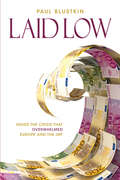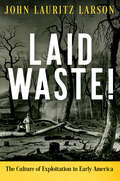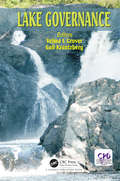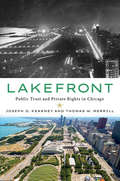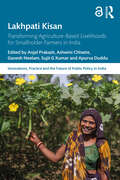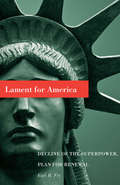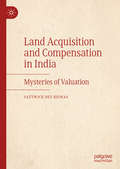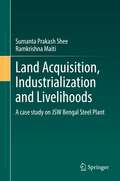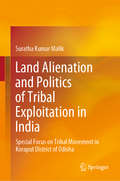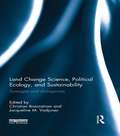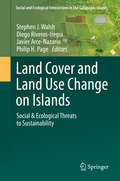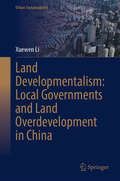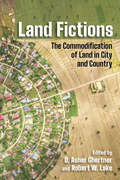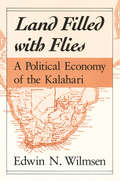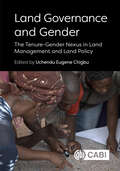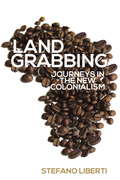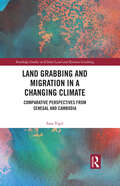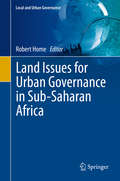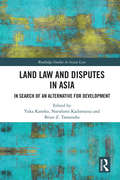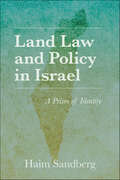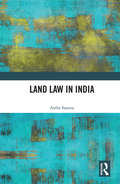- Table View
- List View
Laid Low: Inside the Crisis That Overwhelmed Europe and the IMF
by Paul BlusteinThe latest book by journalist and author Paul Blustein to go behind the scenes at the highest levels of global economic policy making, Laid Low chronicles the International Monetary Fund's role in the euro-zone crisis. Based on interviews with a wide range of participants and scrutiny of thousands of documents, the book tells how the IMF joined in bailouts that all too often piled debt atop debt and imposed excessively harsh conditions on crisis-stricken countries. As the author shows, IMF officials had grave misgivings about a number of these rescues, but went along at the insistence of powerful European policy makers -- to the detriment of the Fund's credibility, with disheartening implications for the management of future crises. The narrative ends with a tale of the clash between Greece's radical Syriza government and the country's creditor institutions that reached a dramatic climax in the summer of 2015.
Laid Low: Inside the Crisis That Overwhelmed Europe and the IMF
by Paul BlusteinThe latest book by journalist and author Paul Blustein to go behind the scenes at the highest levels of global economic policy making, Laid Low chronicles the International Monetary Fund’s role in the euro-zone crisis. Based on interviews with a wide range of participants and scrutiny of thousands of documents, the book tells how the IMF joined in bailouts that all too often piled debt atop debt and imposed excessively harsh conditions on crisis-stricken countries. As the author shows, IMF officials had grave misgivings about a number of these rescues, but went along at the insistence of powerful European policy makers — to the detriment of the Fund’s credibility, with disheartening implications for the management of future crises. The narrative ends with a tale of the clash between Greece’s radical Syriza government and the country’s creditor institutions that reached a dramatic climax in the summer of 2015.
Laid Waste!: The Culture of Exploitation in Early America (Early American Studies)
by John Lauritz LarsonAfter humble beginnings as faltering British colonies, the United States acquired astonishing wealth and power as the result of what we now refer to as modernization. Originating in England and Western Europe, transplanted to the Americas, then copied around the world in the nineteenth and twentieth centuries, this process locked together science and technology, political democracy, economic freedom, and competitive capitalism. This has produced for some populations unimagined wealth and material comfort, yet it has also now brought the global environment to a tipping point beyond which life as we know it may not be sustainable. How did we come to endanger the very future of life on earth in our heedless pursuit of wealth and happiness?In Laid Waste!, John Lauritz Larson answers that question with a 350-year review of the roots of an American "culture of exploitation" that has left us free, rich, and without an honest sense of how this crisis came to be. Larson undertakes an ambitious historical synthesis, seeking to illuminate how the culture of exploitation grew out of the earliest English settlements and has continually undergirded U.S. society and its cherished myths. Through a series of meditations on key concepts, the story moves from the starving times of early Jamestown through the rise of colonial prosperity, the liberation of the revolutionary generation, the launching of the American republic, and the emergence of a new global industrial power by the end of the nineteenth century. Through this story, the book explores the rise of an American sense of righteousness, entitlement, and destiny that has masked any recognition that our wealth and success has come at expense to anyone or anything. Part polemic, part jeremiad, and part historical overview, Laid Waste! is a provocative and bracing account of how the development of American culture itself has led us to today's crises.
Laizität und Sozialdemokratie: Eine vergleichende Untersuchung von Religions- und Weltanschauungspolitik in Frankreich, Spanien und Deutschland
by Jonas MayDie Öffnung sozialdemokratischer und sozialistischer Parteien gegenüber Religions- und Weltanschauungsgemeinschaften hat zu uneinheitlichen Situationen in den ursprünglich religionskritischen, laizistischen Parteien geführt. Bei allen gemeinsam geteilten Werten der europäischen Schwesterparteien existieren divergierende laizistische Grundhaltungen und Auslegungsarten des Konzeptes der Laizität. Diese bilden den Gegenstand der vorliegenden Arbeit: Die laizistischen Grundhaltungen verschiedener sozialdemokratischer Parteien in Europa werden herausgestellt, verglichen und analysiert. Dies geschieht durch eine Inhaltsanalyse von Parteipublikationen, die ergänzt wird durch Experteninterviews mit prominenten Vertretern der Parteien – so u.a. mit dem früheren spanischen Ministerpräsidenten José Luis Zapatero, mit dem ehemaligen Bundestagspräsidenten Wolfgang Thierse oder mit dem früheren Nationalen Sekretär für Laizität in Frankreich Jean Glavany. Anschließend werden auf Grundlage einer vergleichend ausgerichteten Analyse laizistischer Deutungsmuster der Parteien perspektivisch mehrere Erklärungsansätze und Einflussfaktoren auf die unterschiedlichen laizistischen Ausprägungen formuliert.
Lake Governance: Lessons In Participatory Governance
by Velma I. Grover Gail KrantzbergThe Lake Governance book will focus on comparative analysis of governance structures by examining policy, legal and institutional structures of current transboundary commissions to develop a common framework for good governance of transboundary lakes. Cooperation among nations sharing natural resources is important for sustainable use of the shared resources. Lakes contribute a big part to GDP in most of the countries and in some cases are also responsible for providing fisheries (for food, source of protein and livelihood). Climate change and associated risks and uncertainties add more complexity to the problems. This book will explore current water governance challenges, knowledge gaps and recommend a framework for good lake governance.
Lakefront: Public Trust and Private Rights in Chicago
by Thomas W. Merrill Joseph D. KearneyHow did Chicago, a city known for commerce, come to have such a splendid public waterfront—its most treasured asset? Lakefront reveals a story of social, political, and legal conflict in which private and public rights have clashed repeatedly over time, only to produce, as a kind of miracle, a generally happy ending. Joseph D. Kearney and Thomas W. Merrill study the lakefront's evolution from the middle of the nineteenth century to the twenty-first. Their findings have significance for understanding not only Chicago's history but also the law's part in determining the future of significant urban resources such as waterfronts. The Chicago lakefront is where the American public trust doctrine, holding certain public resources off limits to private development, was born. This book describes the circumstances that gave rise to the doctrine and its fluctuating importance over time, and reveals how it was resurrected in the later twentieth century to become the primary principle for mediating clashes between public and private lakefront rights. Lakefront compares the effectiveness of the public trust idea to other property doctrines, and assesses the role of the law as compared to more institutional developments, such as the emergence of sanitary commissions and park districts, in securing the protection of the lakefront for public uses. By charting its history, Kearney and Merrill demonstrate that the lakefront's current status is in part a product of individuals and events unique to Chicago. But technological changes, and a transformation in social values in favor of recreational and preservationist uses, also have been critical. Throughout, the law, while also in a state of continual change, has played at least a supporting role.
Lakhpati Kisan: Transforming Agriculture-Based Livelihoods for Smallholder Farmers in India (Public Policy in India)
by Anjal Prakash, Ashwini Chhatre, Ganesh Neelam, Sujit G Kumar and Apurva DudduAgriculture plays an essential role in the growth of developing economies, as agricultural production is key to food security and is closely intertwined with the livelihoods of many. This book explores the lives of smallholder agricultural farmers in India and the dire challenges that agricultural households face.Focussing on the Lakhpati Farmers initiative, the book examines interventions made by the programme to economically empower farmers and accelerate income growth in the agriculture sector. The programme, initiated by the Collectives for Integrated Livelihood Initiatives (CInI) in the tribal belts of central Indian states, helped farmers earn over INR 100,000 (or one lakh – hence Lakhpati) per annum. The programme engaged with households in 12 districts across 4 states – Jharkhand, Odisha, Maharashtra, and Gujarat – to bring about change through economic empowerment and improve the quality of life of tribal communities. This book documents these initiatives and strategies to meet the aspirations of small and marginal farmers by understanding the ingredients, processes, and challenges involved. The book analyses the programme, examines case studies, and offers ways forward.Part of the Innovations, Practice and the Future of Public Policy in India series, this volume will interest students and researchers of agriculture and rural development, business management, governance, public policy, development studies, and sociology.This book is freely available as a downloadable Open Access PDF at http://www.taylorfrancis.com under a Creative Commons (CC-BY-NC-ND) 4.0 license.
Lament for America: Decline Of The Superpower, Plan For Renewal
by Earl H. FryLament for America explores the major challenges to the status of the United States as a world superpower. In delving into the fundamental question of whether or not a relative decline is inevitable, the author recognizes that the changes faced over the next few decades will be more rapid and transformational than at any other period in American history. Lament for America offers concrete recommendations for renewal in areas such as defense policy, health care, education, and the environment, and serves as a useful guide to understanding how decisions will shape both the U.S. and global landscapes.
Land Acquisition and Compensation in India: Mysteries of Valuation
by Sattwick Dey BiswasThis book discusses development and land acquisitions in India and analyzes a conceptual framework based on “paradox of values” and “plural value of land.” The research links the issue of valuation to its roots in classic economic theory and to its individual perception. The project offers an insightful perspective on current challenges of urbanization and development in the Global South, where land use regimes are in a highly dynamic transition to allow for urban amenities, housing and industrial land. The author concludes with a derived scheme or framework that addresses various potentials to better address values of land during land acquisition. It is an ideal book for anyone interested in land markets, land appraisal and land economics and land acquisition in the Global South.
Land Acquisition, Industrialization and Livelihoods: A case study on JSW Bengal Steel Plant
by Ramkrishna Maiti Sumanta Prakash SheeThis book provides an assessment of the impacts of human intervention on the natural environment and peoples' livelihoods through land-use conversion due to industrialization. Problems of land acquisition and the execution thereof have varying consequences that depend on the specific geographical as well as socio-political contexts in which they occur. This book covers a specific study of JSW Bengal Steel Ltd., which in 2014 planned to set up a 10.0 million ton per year integrated steel plant at the upper catchment of Sundra basin, the tributary of the Shilabati that ultimately pours to the river Rupnarayan, located at Salboni Block of Paschim Medinipur, West Bengal, India. The project was ultimately put on hold, but caused many lingering environmental and socioeconomic problems due to the acquisition of formerly productive lands. The book examines this case to generate a database on the different aspects of land acquisition and its negative impacts on the geomorphology and hydrological of non-timber forest products, agricultural impacts resulting in livelihood changes, policy dimensions of land acquisition, and the impacts of delays in project implementation through a comparative analysis between projects-affected areas and non-project areas. The book will appeal to environmental managers and industry workers, as well as students and researchers in environmental economics, anthropology, and human geography.
Land Alienation and Politics of Tribal Exploitation in India: Special Focus on Tribal Movement in Koraput District of Odisha
by Suratha Kumar MalikThis book explores tribal land alienation problems in India and tribal agitation against land encroachment and alienation. It discusses India’s tribal land problem and explains how despite legislation to protect tribal lands, the problem has not been resolved since neither the letter nor the spirit of the law has been implemented. Due to continuous land encroachment and alienation by outsiders, the negligence of the revenue administration and the apathy of the central and state government, the situation concerning tribal land in the country have became precarious. In this context, the book highlights the process of land estrangement among the tribes and the related movements, focusing on the Narayanpatna land movement in the Koraput district of Odisha. It argues that land remains a central issue that is extremely important for tribes as it directly affects their life, livelihood, freedom and development, and that the cultural attachment of tribes and their views regarding the idea of ‘place’ (land) furnishes crucial perspectives in understanding the politics of collective resistance. It also discusses the politicization of group identity and material interest against the outside authority as the basis of the unrest among the tribes, and when the grudges of the people are hardened due to insensitivity and tyranny, the extent of tribal resistance escalates, leading to conflict between the state and its own people. Given its scope, this book is a valuable resource for students and research scholars, as well as for policymakers and anyone interested in Indian democracy and development in general, and tribal problems, issues and politics in particular.
Land Bargains and Chinese Capitalism
by Meg E. RithmireLand reforms have been critical to the development of Chinese capitalism over the last several decades, yet land in China remains publicly owned. This book explores the political logic of reforms to land ownership and control, accounting for how land development and real estate have become synonymous with economic growth and prosperity in China. Drawing on extensive fieldwork and archival research, the book tracks land reforms and urban development at the national level and in three cities in a single Chinese region. The study reveals that the initial liberalization of land was reversed after China's first contemporary real estate bubble in the early 1990s and that property rights arrangements at the local level varied widely according to different local strategies for economic prosperity and political stability. In particular, the author links fiscal relations and economic bases to property rights regimes, finding that more 'open' cities are subject to greater state control over land.
Land Change Science, Political Ecology, and Sustainability: Synergies and divergences
by Christian Brannstrom Jacqueline M. VadjunecRecent claims regarding convergence and divergence between land change science and political ecology as approaches to the study of human-environment relationships and sustainability science are examined and analyzed in this innovative volume. Comprised of 11 commissioned chapters as well as introductory and concluding/synthesis chapters, it advances the two fields by proposing new conceptual and methodological approaches toward integrating land change science and political ecology. The book also identifies areas of fundamental difference and disagreement between fields. These theoretical contributions will help a generation of young researchers refine their research approaches and will advance a debate among established scholars in geography, land-use studies, and sustainability science that has been developing since the early 2000s. At an empirical level, case studies focusing on sustainable development are included from Africa, Central and South America, and Southeast Asia. The specific topics addressed include tropical deforestation, swidden agriculture, mangrove forests, gender, and household issues.
Land Cover and Land Use Change on Islands: Social & Ecological Threats to Sustainability (Social and Ecological Interactions in the Galapagos Islands)
by Stephen J. Walsh Philip H. Page Diego Riveros-Iregui Javier Arce-NazarioGlobalization is not a new phenomenon, but it is posing new challenges to humans and natural ecosystems in the 21st century. From climate change to increasingly mobile human populations to the global economy, the relationship between humans and their environment is being modified in ways that will have long-term impacts on ecological health, biodiversity, ecosystem goods and services, population vulnerability, and sustainability. These changes and challenges are perhaps nowhere more evident than in island ecosystems. Buffeted by rising ocean temperatures, extreme weather events, sea-level rise, climate change, tourism, population migration, invasive species, and resource limitations, islands represent both the greatest vulnerability to globalization and also the greatest scientific opportunity to study the significance of global changes on ecosystem processes, human-environment interactions, conservation, environmental policy, and island sustainability.In this book, we study islands through the lens of Land Cover/Land Use Change (LCLUC) and the multi-scale and multi-thematic drivers of change. In addition to assessing the key processes that shape and re-shape island ecosystems and their land cover/land use changes, the book highlights measurement and assessment methods to characterize patterns and trajectories of change and models to examine the social-ecological drivers of change on islands. For instance, chapters report on the results of a meta-analysis to examine trends in published literature on islands, a satellite image time-series to track changes in urbanization, social surveys to support household analyses, field sampling to represent the state of resources and their limitations on islands, and dynamic systems models to link socio-economic data to LCLUC patterns. The authors report on a diversity of islands, conditions, and circumstances that affect LCLUC patterns and processes, often informed through perspectives rooted, for instance, in conservation, demography, ecology, economics, geography, policy, and sociology.
Land Developmentalism: Local Governments and Land Overdevelopment in China (Urban Sustainability)
by Xuewen LiThis book examines the strategies adopted by local governments to obtain excess construction land quotas in the face of the central government’s strict land management system. It applies game theory, principal-agent theory, collective action theory, and competition and collusion theory to analyze the trade-offs and constraints faced by local governments under the existing institutional framework. It also empirically tests the imitative competitive strategy of land violation and the institutional collusion strategy of land development rights trading using spatial panel model and Tobit model. The book reveals the internal mechanism behind local governments’ simultaneous adoption of competitive and collusive strategies in pursuing local interests and economic growth. It also shows how local governments’ land violations have significant strategic characteristics in time and space, and how economic development gap, resource endowment gap, and human network relationship influence their collusion formation in land development rights trading. This book is a valuable contribution to the literature on land management, local governance, and political economy in China. It is suitable for scholars, students, policy makers, and practitioners who are interested in understanding the complex dynamics of land development in China. The book is written in an accessible and engaging style, with clear explanations of theoretical concepts and empirical methods.
Land Fictions: The Commodification of Land in City and Country (Cornell Series on Land: New Perspectives on Territory, Development, and Environment)
Land Fictions explores the common storylines, narratives, and tales of social betterment that justify and enact land as commodity. It interrogates global patterns of property formation, the dispossessions property markets enact, and the popular movements to halt the growing waves of evictions and land grabs.This collection brings together original research on urban, rural, and peri-urban India; rapidly urbanizing China and Southeast Asia; resource expropriation in Africa and Latin America; and the neoliberal urban landscapes of North America and Europe. Through a variety of perspectives, Land Fictions finds resonances between local stories of land's fictional powers and global visions of landed property's imagined power to automatically create value and advance national development. Editors D. Asher Ghertner and Robert W. Lake unpack the dynamics of land commodification across a broad range of political, spatial, and temporal settings, exposing its simultaneously contingent and collective nature. The essays advance understanding of the politics of land while also contributing to current debates on the intersections of local and global, urban and rural, and general and particular.Contributors Erik Harms, Michael Watts, Sai Balakrishnan, Brett Christophers, David Ferring, Sarah Knuth, Meghan Morris, Benjamin Teresa, Mi Shih, Michael Levien, Michael L. Dwyer, Heather Whiteside
Land Filled with Flies: A Political Economy of the Kalahari
by Edwin N. Wilmsen"The image of a pristine isolation has been almost as common in research on foragers as in the popular media. Land filled with Flies is a sustanined argument against such views. Wilmsen marshals an enormous quantity of historical, archival, archeological, ethnographic, and survey data on the Kalahari Zhu to show how far from the reality these images are, how they have their own historical provenance, how they have been analytically distorting, and how they have proven politically pernicious for living groups like the Zhu."—Pauline Peters, Science "[A] major work. . . . Anthropologists will, and should, use Wilmsen's meticulously detailed study to revise their early lectures in the introductory course, and no future study of African 'foragers' should ignore it."—Parker Shipton, American Anthropologist "An impressive book. . . . The reader need only read the first few pages to judge both the quality and ambitiousness of the work. . . . Essential reading."—David R. Penna, Africa Today
Land Governance and Gender: The Tenure-Gender Nexus in Land Management and Land Policy
by Uchendu Eugene ChigbuThis book delivers new conceptual and empirical studies surrounding the design and evaluation of land governance, focusing on land management approaches, land policy issues, advances in pro-poor land tenure and land-based gender concerns. It explores alternative approaches for land management and land tenure through international experiences. Part 1 covers Concepts, debates and perspectives on the governance and gender aspects of land. Part 2 focuses on Tenure-gender dimensions in land management, land administration and land policy. It deals with land issues within the interface of theory and practice. Part 3 covers Applications and experiences: techniques, strategies, tools, methods, and case studies. Part 4 focuses on Land governance, gender, and tenure innovations. Case studies discussed include China, Ethiopia, Ghana, Lesotho, Germany, Mexico, Mozambique, Rwanda, South Korea, etc. Themes include Islamic tenure, reverse migration, matriarchy/matrilineal systems, structural inequality, tenure-responsive planning, land-related instabilities and COVID-19, urban-rural land concerns, women's tenure bargaining, tenure-gender nexus concerns in developing and developed countries. This book: · Includes theoretical or empirical studies on land governance and gender from a diverse group of countries. · Provides the basis for a new land administration theory to be set against conventional land administration approaches. · Offers, in an accessible manner, a range of new tools for design and evaluation of land management interventions. The book will be valuable for students and researchers in land governance, urban and rural planning, international development,natural resource management, agriculture, community development, and gender studies. It is also useful for land practitioners, including those working within international organizations.
Land Grabbing
by Enda Flannelly Stefano LibertiTo the governments and corporations buying up vast tracts of the Third World, it is 'land leasing'; to its critics, it is nothing better than 'land grabbing' - the engine powering a new era of colonialism. In this arresting account of how millions of hectares of fertile soil are stolen to feed wealthy westerners thousands of miles away, journalist Stefano Liberti takes readers on a tour of contemporary exploitation. It is a journey encompassing a Dutch-owned model farm in Ethiopia; a conference in Riyadh, where representatives of Third World governments compete to attract Saudi investors; meetings in Rome where the fate of nations is decided; and the headquarters of the Movement of Landless Workers in São Paulo. Since the food crisis of 2007-8, when the cost of staples such as rice and corn went through the roof, the race to acquire land in the southern hemisphere has become more intense than ever. Land Grabbing is the shocking story of how one half of the world is starved to feed the other.r edition.
Land Grabbing and Migration in a Changing Climate: Comparative Perspectives from Senegal and Cambodia (Routledge Studies in Global Land and Resource Grabbing)
by Sara VigilThis book provides a theoretical and empirical examination of the links between environmental change, land grabbing, and migration, drawing on research conducted in Senegal and Cambodia. While the impacts of environmental change on migration and of environmental discourses on land grabs have received increased attention, the role of both environmental and migration narratives in shaping migration by modifying access to natural resources has remained under-explored. Using a variegated geopolitical ecology framework and a comparative global ethnographic approach, this book analyses the power of mainstream adaptation and security frameworks and how they impact the lives of marginalised and vulnerable communities in Senegal and Cambodia. Findings across the cases show how environmental and migration narratives, linked to adaptation and security discourses, have been deployed advertently or inadvertently to justify land capture, leading to interventions that often increase, rather than alleviate, the very pressures that they intend to address. The interrelations between these issues are inherent to the tensions that exist, in different contexts and at different times, between capital accumulation and political legitimation. The findings of the book point to the urgency for researchers and policymakers to address the structural causes, and not the symptoms, of both environmental destruction and forced migration. It shows how acting upon environmental change, land grabs, and migration in isolated or binary manners can increase, rather than alleviate, pressures on those most socio-environmentally vulnerable. This book will be of interest to students, scholars, and practitioners working on the topics of land and resource grabbing and environmental change and migration. The book will also be of interest to those analysing political ecology transitions in Africa and Asia, as well as to those interested in novel theoretical and methodological frameworks.
Land Issues for Urban Governance in Sub-Saharan Africa (Local and Urban Governance)
by Robert HomeSub-Saharan Africa faces many development challenges, such as its size and diversity, rapid urban population growth, history of colonial exploitation, fragile states and conflicts over land and natural resources. This collection, contributed from different academic disciplines and professions, seeks to support the UN Habitat New Urban Agenda passed at Habitat III in Quito, Ecuador, in 2016. It will attract readers from urban specialisms in law, geography and other social sciences, and from professionals and policy-makers concerned with land use planning, surveying and governance.Among the topics addressed by the book are challenges to governance institutions: how international development is delivered, building land management capacity, funding for urban infrastructure, land-based finance, ineffective planning regulation, and the role of alternatives to courts in resolving boundary and other land disputes. Issues of rights and land titling are explored from perspectives of human rights law (the right to development, and women's rights of access to land), and land tenure regularization. Particular challenges of housing, planning and informality are addressed through contributions on international real estate investment, community participation in urban settlement upgrading, housing delivery as a partly failing project to remedy apartheid's legacy, and complex interactions between political power, money and land. Infrastructure challenges are approached in studies of food security and food systems, urban resilience against natural and man-made disasters, and informal public transport.
Land Law and Disputes in Asia: In Search of an Alternative for Development (Routledge Studies in Asian Law)
by Brian Z. Tamanaha Yuka Kaneko Narufumi KadomatsuThrough an in-depth legal analysis by leading scholars, this book searches for the exact legal causes of land-related disputes in Asia within the histories, legal systems and social realities of the respective countries. It consists of four main parts: examining the relationship between law and development; land-taking in developmental stages; common ownership; and proposals for new approaches to land law and dispute resolution. With a combination of orthodox legal interpretations and the empirical approach of legal sociology, the contributors undertake an extensive comparative legal analysis across common and civil law traditions. Most importantly, they propose pathways forward for legal transformations in the pursuit of sustainable development in Asia. This book is vital contribution to the study of comparative law, and especially property law, in East and Southeast Asia.
Land Law and Policy in Israel: A Prism of Identity (Perspectives on Israel Studies)
by Haim SandbergAs one of the smallest and most densely populated countries in the world, the State of Israel faces serious land policy challenges and has a national identity laced with enormous internal contradictions. In Land Law and Policy in Israel,Haim Sandberg contends that if you really want to know the identity of a state, learn its land law and land policies.Sandberg argues that Israel's identity can best be understood by deciphering the code that lies in the Hebrew secret of Israeli dry land law. According to Sandberg, by examining the complex facets of property law and land policy, one finds a unique prism for comprehending Israel's most pronounced identity problems.Land Law and Policy in Israel explores how Israel's modern land system tries to bridge the gaps between past heritage and present needs, nationalization and privatization, bureaucracy and innovation, Jewish majority and non-Jewish minority, legislative creativity and judicial activism. The regulation of property and the determination of land usage have been the consequences of explicit choices made in the context of competing and evolving concepts of national identity. Land Law and Policy in Israel will prove to be a must-read not only for anyone interested in Israel but also for anyone who wants to understand the importance of land law in a nation's life.
Land Law in India
by Astha SaxenaThis book is a critical study of the laws regulating landownership patterns. Land and land law are woven into the fabric of our society and are therefore integral to the substantive questions of equality and developmental ideologies of the state. This volume uncovers the socio-economic realities that surround land and approaches the law from the standpoint of the marginalized, landless and the dispossessed. This book: Undertakes an extensive survey of existing legislations, both at the union and state level through a range of analytical tables; Discusses the issues of land reform; abolition of intermediaries and tenancy reform; need for redistribution; ceilings on agricultural holdings; law of land acquisition; legal construction of public purpose and displacement, dispossession, compensation, and rehabilitation to construct a case for redistribution; Inquires into the phenomenon of landlessness that widely prevails in India today and lays bare its causes. An invaluable resource, this volume will be an essential read for all students and researchers of law, political studies, sociology, political economy, exclusion studies, development studies, and Asian studies.
Land Marks: A Novel
by Maryann LesertOnce you've experienced the devastation of fracking, nothing but stopping it makes sense. After a year of well site visits and protests, four college student activists become determined to protect the people and the places they love.In the river-crossed northwoods of Michigan, Kate, Brett, Sonya, and Mark, mentored by their former professor Rebecca, keep watch as North American Energy (NorA) connects a corridor of frack well sites deep in the state forests. When NorA expands in unexpected directions and their awful, bigger plan becomes clear, the action begins.As grassroots activists gather and prepare to stop NorA&’s dangerous superfrac, stresses other than the fracturing of the bedrock appear. Sonya is arrested, Rebecca reveals her hidden past, and the one person who knows both women&’s stories arrives in camp. Love and solidarity want to win, even if most showdowns with Big Oil don&’t end well for those who take a stand.Suspenseful, poignant, and galvanizing, Land Marks is a tribute to the waterways that connect us, the land that sustains us, and the moments that inspire us to rise up together to say, &“No more!&”
